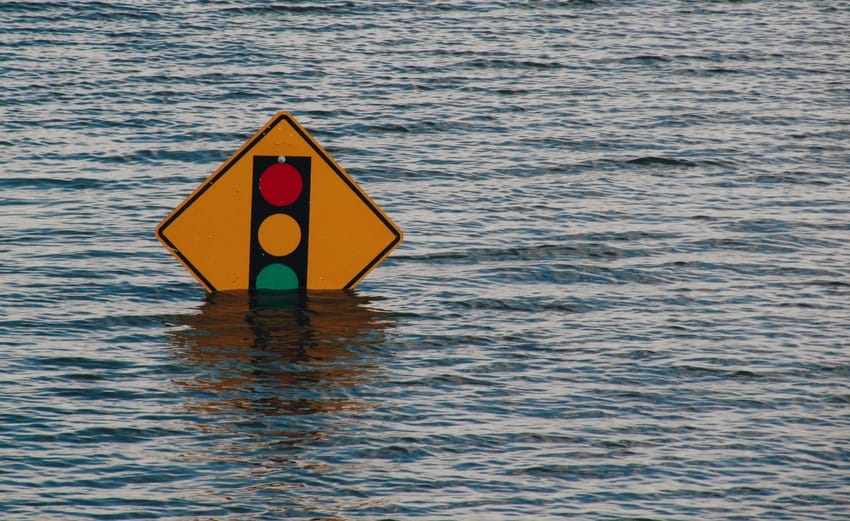Stop Water From Getting Through Your Garage Door

Is there a worse feeling than coming home to discover water damage to your personal property? Probably not, and one of the most notorious spots where water damage originates is inside your garage, often due to its exposure to the exterior of your home.
Consequently, keeping water from entering through the garage door and working with a garage door installation company to protect your belongings seems like a good option. Even small leaks – the kind where you say “Oh, I’ll get to that before it rains the next time…” – can lead to bigger problems. Water damage isn’t a given.
GARAGE FLAWS
Many people can relate to how terrible it feels to return home after a heavy rain, open their garage door, and find water puddles throughout. The issue isn’t the rain, but something more basic – how the garage was designed. Garages aren't meant to be waterproof, which is unfortunate considering the time and effort that goes into door, window, and roof construction.
Because water can enter the tiniest spaces – seams between sections of concrete, a brick foundation that’s eroded over time – it’s bound to get into your garage. Eventually, your personal belongings, garage floor, and garage walls will acquire rain damage.
KEEP YOUR GARAGE FROM LEAKING
There are several ways that water gets into your garage, and just as many solutions to consider. Whichever one you choose depends on your personal situation and budget.
- Don’t forget the seals - Your garage door should include a flexible seal extending the full width of the door. If the seal works as designed, it will help ensure the door fits tightly to the cement when in a closed position. Unfortunately, these seals break down over time and allow water and insects to enter the garage. Thankfully, the seals can be replaced by garage door installers, which is a good option to keep water out. Once a faulty seal has been replaced with a new one, check your garage floor after the next rain to see how well it works.
- Improve your landscaping - If the landscaping around the driveway leading to the garage is higher than the driveway itself, water will inevitably flow to the lowest spot and will most likely end up in your garage. You want to make sure water drains from your lawn or other landscaped areas, so you may need to improve your yard's drainage. The same idea applies to landscaping around the sides or perimeter of your garage. Proper landscaping is especially important along the sides of your garage if your property abuts your neighbor’s home, and their landscaping flows toward your garage.
- Inspect your gutters - If you have gutters installed around the perimeter of your garage, make sure that gutters are affixed properly and don’t leak. If the homebuilder tried to save money by not installing gutters around the garage, especially over the door, you probably want to see about installing gutters with downspouts before experiencing more severe water damage. Repairing or installing gutters may be expensive, but those steps could be worth the cost if they save your belongings from serious harm.
- How about a French drain? - Our garage door service team often sees homes where the driveway slopes toward the garage, rather than away from it. If your property is designed in this manner, one solution to consider is a French drain. This is a type of drain where a narrow trench is cut into the driveway, a steel or PVC U-shaped channel is dropped in, and the top is covered with an iron gate – allowing water to flow away freely from the garage. This type of solution can also apply to landscaping, especially if the property alongside the garage slopes toward it. The only drawback is you’ll have to clear the trench of debris a few times a year.
- New cement work - The two most expensive solutions are a new driveway or garage floor. Depending on your finances, you may want a new garage floor installed which slopes from back to front – thereby preventing water from staying puddled after a storm. Some homeowners also get new cement work – a new driveway or walkway that slopes away from the garage. Both solutions, however, require professional help, and aren’t recommended when there are more cost-effective options to consider. These should be your last resort.
SOLVING THE LEAK PROBLEM
We'd be remiss if we didn't recommend you start with the least expensive and time-consuming solutions available. Check for the obvious culprit first, then progress through other possibilities. In some cases, you can keep the water from getting through your garage door with common-sense fixes. When a rainstorm is in the forecast, it's a good idea to stay home and monitor the situation. If possible, stay inside your garage with the door closed to see exactly where the rain's coming in, and have someone else on the outside to do the same. Unfortunately, you may discover water enters the garage from multiple locations.
KEEP WATER FROM GETTING UNDER YOUR GARAGE DOOR
One of the best ways to keep water from getting under your garage door is to consider a new garage door installation in Denver. A Better Garage Door's professionals have more than 20 years of experience, and we pride ourselves on exceptional customer service and products to meet your needs. Locally owned and operated, our team depends on your satisfaction. We take extra time to understand your garage door problems, give honest feedback, and never offer solutions that aren’t cost-effective. Call us today at 303-920-2267 or contact us online to request information.